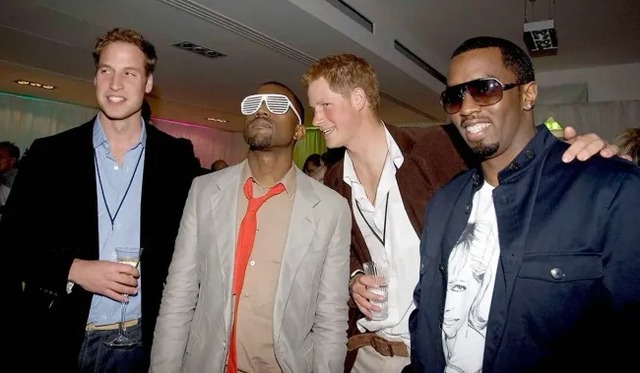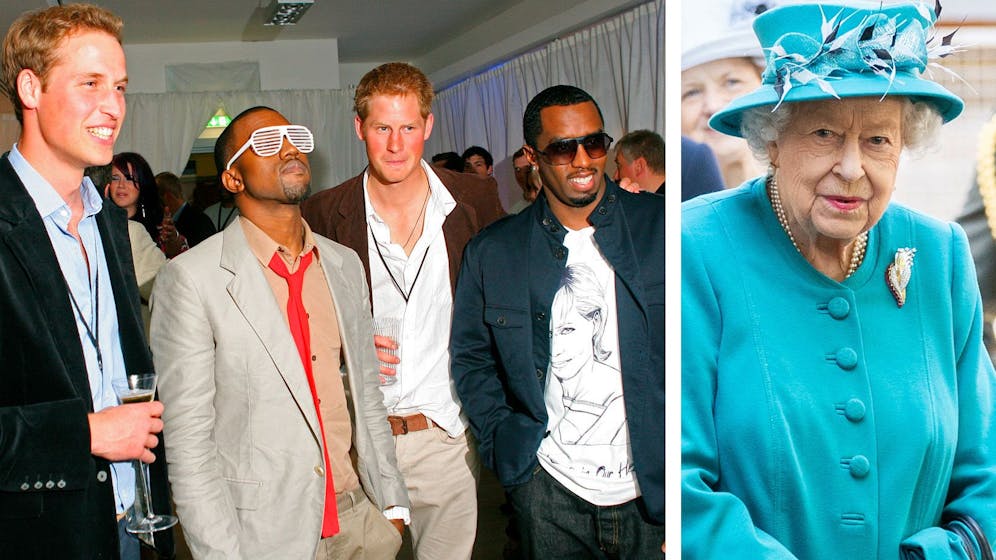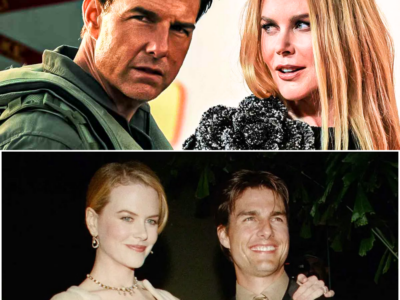In a revelation that has sent shockwaves through both royal and entertainment circles, it has come to light that Prince William and Prince Harry, the grandsons of the late Queen Elizabeth II, were repeatedly invited to attend the extravagant and now-notorious parties hosted by Sean “Diddy” Combs, the American rapper and music mogul. These invitations, extended during the early 2000s, were part of Diddy’s apparent fascination with the British royal family, a fixation that saw him attempt to lure the young princes into his social orbit. However, thanks to the prudent decisions of the princes—or, more likely, their astute palace advisors—the brothers consistently declined these invitations, a choice that has since been described as a fortunate escape from what could have been a catastrophic association. This article delves into the details of Diddy’s invitations, the context of his parties, the royal family’s response, and the broader implications of the princes’ decision to steer clear of the disgraced mogul’s world.
Diddy’s Obsession with the British Royals
Sean “Diddy” Combs, a prominent figure in the music industry known for his lavish lifestyle and star-studded events, reportedly harbored a deep fascination with the British royal family. According to Rob Shuter, who served as Diddy’s publicist from 2002 to 2004, the rapper saw himself as a “king” and believed that having two princes—William and Harry—in his entourage would enhance his image as the “party king of New York.” Shuter revealed to BBC News that Diddy instructed him to contact the princes more than ten times, offering to cover their travel, lodging, and even security expenses to entice them to attend his events. In a particularly striking detail, Shuter noted that Diddy kept framed photographs of the young royals in his New York apartment, underscoring his fixation on their status and allure.

The invitations were extended during a period when William and Harry, then in their late teens and early twenties, were known for their lively social lives. The brothers frequently made headlines for their “party animal antics” at London nightclubs, a phase that Diddy likely saw as an opportunity to connect with them. In a 2011 appearance on The Graham Norton Show, Diddy humorously acknowledged his earlier attempts to invite the princes, noting that he wanted to “hang out” with them when they were “young bucks getting into trouble.” However, by 2011, with Prince William preparing to marry Kate Middleton, Diddy quipped that the princes were “off the list,” signaling that he had ceased his efforts to include them in his social circle.
The Nature of Diddy’s Parties
Diddy’s parties, particularly his annual White Parties held in the Hamptons and Beverly Hills from 1998 to 2009, were legendary for their opulence and exclusivity. Attended by A-list celebrities such as Jay-Z, Beyoncé, Jennifer Lopez, and Leonardo DiCaprio, these events were synonymous with luxury, featuring champagne, caviar, and an all-white dress code that Diddy described as a way to “strip away everyone’s image and put us all in the same color, and on the same level.” However, in recent years, these gatherings—especially the so-called “Freak Offs”—have come under intense scrutiny following Diddy’s arrest in September 2024 on federal charges of sex trafficking, racketeering, and transportation to engage in prostitution.
According to a 14-page indictment, Diddy’s parties allegedly involved “elaborate and produced sex performances,” with law enforcement seizing over 1,000 bottles of baby oil and lubricant during raids on his properties in Los Angeles and Miami. Prosecutors claim that Diddy coerced victims into participating in prolonged sexual sessions, often involving drugs and prostitutes, at these events. The allegations have cast a dark shadow over Diddy’s reputation, with multiple lawsuits accusing him of assault, rape, and sexual extortion. One particularly disturbing claim involves a 16-year-old attendee at a White Party who alleged that Diddy demanded he drop his pants as part of a “rite of passage,” while another lawsuit references Diddy’s use of recordings to blackmail guests.
The Royal Family’s Prudent Response
The decision by Prince William and Prince Harry to decline Diddy’s invitations proved to be a stroke of foresight. Royal biographer Christopher Andersen, author of The King, noted that the princes’ palace handlers played a crucial role in ensuring they avoided Diddy’s events. “As young bachelors, William and Harry might easily have said yes and attended one of Diddy’s wild parties,” Andersen told Fox News. “Thanks to their palace handlers, they dodged a bullet there.” This decision was particularly significant given the princes’ public profiles and the potential for scandal to tarnish the monarchy’s reputation.

The British royal family has long been sensitive to controversy, especially in light of past scandals involving figures like Prince Andrew, whose association with Jeffrey Epstein severely damaged his standing. King Charles III, aware of the monarchy’s vulnerability to such associations, must have been relieved that his sons avoided any entanglement with Diddy. Andersen remarked, “King Charles must be grateful that his sons’ encounters with Diddy didn’t include participating in the rap star’s infamous ‘freak offs.’” The princes’ only known interaction with Diddy occurred in 2007 at the Concert for Diana, a charity event they hosted at Wembley Stadium to honor their late mother, Princess Diana. Diddy performed at the concert, and photos show the princes posing with him and Kanye West at the after-party, but their contact appears to have been limited to this public, above-board event.
A Narrow Escape from Disaster
The princes’ decision to steer clear of Diddy’s parties has been described as a “near miss” for the royal family. A Hollywood insider told The Royal Observer that accepting an invitation “could have destroyed them—they are not normal celebs where scandal can easily be spun.” Unlike typical celebrities, the royals operate under intense public scrutiny, and any association with the allegations now surrounding Diddy’s parties could have had devastating consequences for their reputations and the monarchy as a whole. The fact that William and Harry never attended these events has spared the royal family from being dragged into the ongoing legal and media storm surrounding Diddy.
The timing of the invitations is also noteworthy. They were extended in the early 2000s, a period when the princes were navigating their youth and the pressures of their royal roles. By 2010, when William became engaged to Kate Middleton, Diddy reportedly ceased his efforts to invite them, likely recognizing that the princes were transitioning into more settled, responsible roles. This shift was acknowledged humorously on The Graham Norton Show, where host Graham Norton jokingly warned Diddy not to “ruin our royal wedding,” prompting Diddy to confirm that the princes were no longer on his guest list.
Broader Implications and Public Reaction
The revelation of Diddy’s invitations to the princes has sparked significant public interest, particularly in light of his current legal troubles. Social media platforms, including Reddit, have seen discussions about the potential implications of the princes’ association with Diddy, with some users expressing relief that William and Harry avoided his parties. One commenter on the RoyalsGossip subreddit noted, “Thank God they had the good sense to turn down the invitation,” while another remarked on the “skeeved out” feeling of learning that Diddy kept framed photos of the young princes and persistently invited them when they were still teenagers.
The case also highlights the broader issue of celebrity culture and the risks of associating with powerful figures whose public personas may mask troubling behavior. Diddy’s parties were attended by numerous high-profile figures, and the ongoing investigations have raised questions about who else may have been involved or aware of the alleged activities. While Prince Harry was named in a $30 million lawsuit filed by producer Rodney “Lil Rod” Jones, which referenced Diddy’s access to celebrities like the prince to lend “legitimacy” to his events, there is no evidence that Harry or William were aware of or participated in any illicit activities. The mention of Harry’s name appears to be contextual, highlighting Diddy’s connections rather than implicating the prince directly.
Conclusion
The story of Prince William and Prince Harry’s invitations to Diddy’s parties is a tale of caution, foresight, and the protective mechanisms of the British royal family. By declining to attend, the princes avoided a potential scandal that could have had far-reaching consequences, particularly given the serious allegations now surrounding Diddy’s events. The royal family’s careful navigation of these invitations underscores the importance of their advisors in shielding them from risky associations. As Diddy faces trial on charges that have rocked the entertainment world, the princes’ absence from his guest lists stands as a testament to their—or their handlers’—prudent judgment, ensuring that the monarchy emerged unscathed from what could have been a disastrous entanglement.

